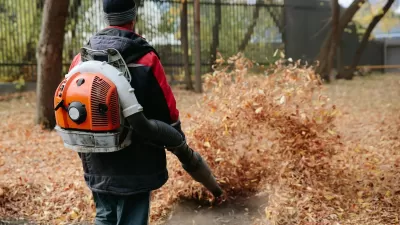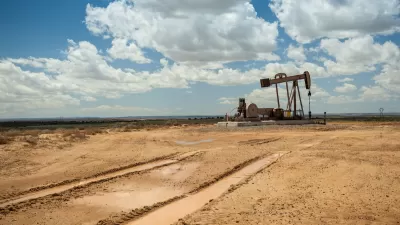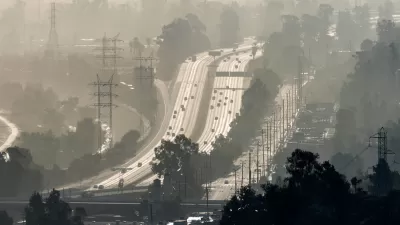Arlington, TX Mayor Robert Chuck is also a physician, acutely aware of the effects of ozone air pollution in his city. In this Q & A with Grist's Jonathan Hiskes, he describes ozone's causes and effects and his role as mayor.
In this interview with the Republican mayor of the seventh largest city in Texas, Mayor Chuck shows how automobile dependence affects public health, and how public health is not a partisan issue.
Mayor Chuck: "We're the largest city in America without a public transportation system. To get anywhere in this city, you have to use an automobile. And every summertime, we begin to see the ozone buildup. Ozone is very toxic to lung tissue. So I can predict, just by going through the ER every morning, how bad the ozone levels are."
"Q. Where is the most ozone pollution coming from?
A. Automobiles and trucks, by far. I suspect the average family here has two cars, maybe three depending on how old their kids are
Q. Once the city has been built around driving, it seems tough to lay down a bicycle network that's safe and comfortable. Are there other land-use steps or zoning changes you're trying to do?
A. Not yet. We were talking yesterday at our council meeting about having to change our perception of land use related to walkability."
From "Mayor, university promote Arlington as ‘College Town'":
"College Town is part of a vision for a renewed downtown Arlington. One with the research and educational powerhouse that is UT-Arlington at its core, but surrounded by performing and fine arts venues, sports, a first-class planetarium and a bevy of retailers and restaurants within an area networked with reclaimed spaces, pedestrian walkways, thousands of students in proximity and accessible linear parks."
FULL STORY: Robert Cluck: Texas doctor, Republican mayor, clean-air champ

Americans May Be Stuck — But Why?
Americans are moving a lot less than they once did, and that is a problem. While Yoni Applebaum, in his highly-publicized article Stuck, gets the reasons badly wrong, it's still important to ask: why are we moving so much less than before?

Using Old Oil and Gas Wells for Green Energy Storage
Penn State researchers have found that repurposing abandoned oil and gas wells for geothermal-assisted compressed-air energy storage can boost efficiency, reduce environmental risks, and support clean energy and job transitions.

Placekeeping: Setting a New Precedent for City Planners
How a preservation-based approach to redevelopment and urban design can prevent displacement and honor legacy communities.

San Francisco’s Muni Ridership Grew in 2024
The system saw its highest ridership since before the Covid-19 pandemic, but faces a severe budget shortage in the coming year.

Colorado Lawmakers Move to Protect BRT Funding
In the face of potential federal funding cuts, CDOT leaders reasserted their commitment to planned bus rapid transit projects.

Safe Streets Funding in Jeopardy
The Trump administration is specifically targeting bike infrastructure and other road safety projects in its funding cuts.
Urban Design for Planners 1: Software Tools
This six-course series explores essential urban design concepts using open source software and equips planners with the tools they need to participate fully in the urban design process.
Planning for Universal Design
Learn the tools for implementing Universal Design in planning regulations.
Heyer Gruel & Associates PA
City of Moreno Valley
Institute for Housing and Urban Development Studies (IHS)
City of Grandview
Harvard GSD Executive Education
Salt Lake City
NYU Wagner Graduate School of Public Service
City of Cambridge, Maryland





























